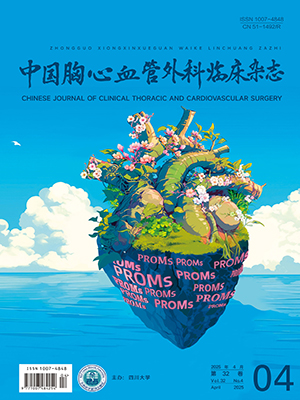| 1. |
Wu PC, Posner MC. The role of surgery in the management of oesophageal cancer. Lancet Oncol, 2003, 4(8):481-488.
|
| 2. |
van Hagen P, Hulshof MC, van Lanschot JJ, et al. Preoperative chemoradiotherapy for esophageal or junctional cancer. N Engl J Med, 2012, 366(22): 2074-2084.
|
| 3. |
Shapiro J, van Lanschot JJ, Hulshof MC, et al. Neoadjuvant chemoradiotherapy plus surgery versus surgery alone for oesophageal orjunctional cancer (CROSS): long-term results of a randomised controlled trial. Lancet Oncol, 2015, 16(9): 1090-1098.
|
| 4. |
Ando N, Kato H, Igaki H, et al. A randomized trial comparing postoperative adjuvant chemotherapy with cisplatin and 5-fluorouracil versus preoperative chemotherapy for localized advanced squamous cell carcinoma of the thoracic esophagus (JCOG9907). Ann Surg Oncol, 2012, 19(1): 68-74.
|
| 5. |
Biere SS, van Berge Henegouwen MI, Maas KW, et al. Minimally invasive open oesophagectomy for patients with oesophageal cancer: a multicentre,open-label, randomised controlled trial. Lancet, 2012, 379(9829): 1887-1892.
|
| 6. |
Amin MB, Edge S, Greene FL, et al. AJCC Cancer Staging Manual. 8th ed. New York: Springer, 2017. 185-202.
|
| 7. |
中国医师协会食管外科专家委员会. 微创食管癌切除术(minimally invasive esophagectomy, MIE)专家共识. 中华胸心血管外科杂志, 2013, 29(7): 385-387.
|
| 8. |
杨弘, 傅剑华, 刘孟忠, 等. 术前放化疗并手术治疗局部晚期食管鳞癌的多中心随机对照临床研究. 中华医学杂志, 2012, 92(15): 1028-1032.
|
| 9. |
郭旭峰, 方文涛. 新分期指导下进展期食管癌术前诱导化疗再思考. 中华外科杂志, 2013, 51(1): 1-3.
|
| 10. |
Straatman J, van der Wielen N, Cuesta MA, et al. Minimally invasive versus open esophageal resection: three-year follow-up of the previously reported randomized controlled trial: the TIME trial. Ann Surg, 2017, 266(2): 232-236.
|
| 11. |
Ben-David K, Rossidis G, Zlotecki RA, et al. Minimally invasive esophagectomy is safe and effective following neoadjuvant chemoradiationtherapy. Ann Surg Oncol, 2011, 18(12): 3324-3329.
|
| 12. |
Bakhos C, Oyasiji T, Elmadhun N, et al. Feasibility of minimally invasive esophagectomy after neoadjuvant chemoradiation. J Laparoendosc Adv Surg Tech A, 2014, 24(10): 688-692.
|
| 13. |
Spector R, Zheng Y, Yeap BY, et al. The 3-hole minimally invasive esophagectomy: a safe procedure following neoadjuvant chemotherapy and radiation. Semin Thorac Cardiovasc Surg, 2015, 27(2): 205-215.
|
| 14. |
郑浩, 汪灏, 唐汉, 等. 新辅助同步放化疗与新辅助化疗治疗局部进展期食管鳞癌的疗效分析. 中华消化外科杂志, 2017, 16(5): 464-468.
|
| 15. |
郭旭峰, 孙涛 ,叶波, 等. 术中非计划事件对于微创食管癌根治术患者术后早期康复的影响. 中华胸部外科电子杂志, 2016, 3(4): 199-203.
|




